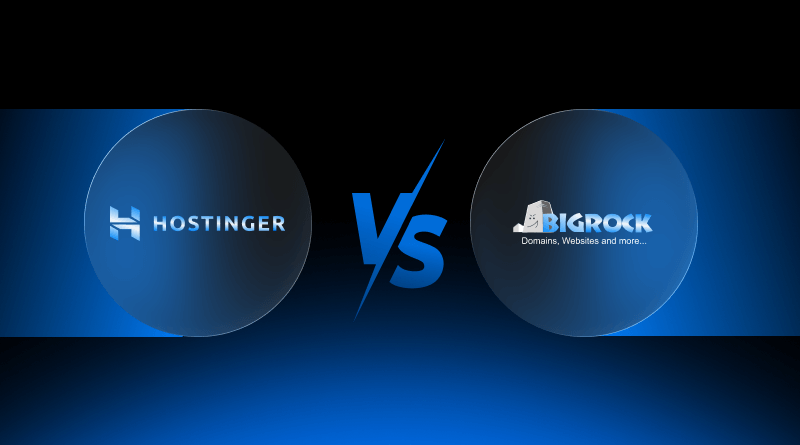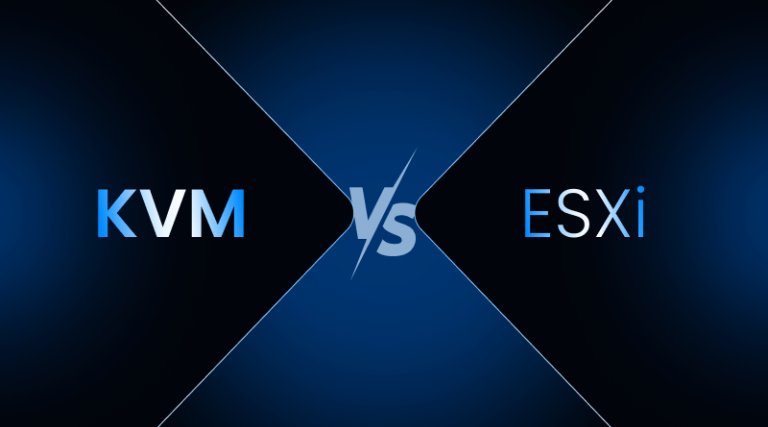With the rapid advancement of the digital market, establishing and growing your online presence has never been more critical. Whether you are a blogger, a small business owner, or an aspiring entrepreneur, the performance, reliability, and responsiveness of your website heavily depend on your web hosting provider. That’s why your first essential step is to choose your hosting platform properly.
When it comes to the Hostinger vs BigRock decision, knowing which one offers greater value is crucial. In this hosting review, we will identify and break down features. If you’re confused between Hostinger and BigRock, you’ll be able to walk away from this blog knowing which provider best fits your needs.
Table Of Content
Foundations of Hostinger and BigRock Platform
In UK, when discussing web hosting provider options, two names are constantly mentioned: Hostinger and BigRock. While both offer plans for the same potential customers (i.e., startups, personal bloggers, and small online businesses), both excel in different areas.
Hostinger
Hostinger is well-known globally for its unique cutting-edge technology and highly competitive pricing. Although it’s based in Lithuania, its products are fully tailored to UK users. It has:
- Data centers are located strategically, including in UK, which helps reduce latency for UK traffic.
- Their commitment to performance speed and extensive network makes Hostinger a popular option for anyone who needs a faster loading website, website scaling, etc.
BigRock
BigRock’s services are delivered to UK entrepreneurs. Whether you are building your portfolio site online or simply want to set up an online store, BigRock’s knowledge of the market can help.
This Hostinger alternative adopts a more local approach and promises:
- Simple payment through UK local payment gateways, UPI, NetBanking, and wallets.
- Billing in Pound, so no nasty exchange surprises.
- UK support, which many prefer for technical issues, as it can be more accessible to get you up and running.
Uptime Matters: BigRock vs Hostinger Comparison
Hostinger Performance
Hostinger ensures a 99.9% uptime guarantee, and mostly it actually delivers. Hostinger provides localized servers in UK to help minimize latency and optimize speed for users in the country. Page speed tests on real-world WordPress sites hosted on Hostinger frequently measure page load speeds below one second, all thanks to Hostinger’s efficient server stack and performance-oriented system design.
BigRock Performance
BigRock takes care of the basics, but does not offer some of the key performance aspects provided by its competitors, such as Hostinger. For example, BigRock does not offer LiteSpeed servers and typically relies on a 3rd-party CDN service like Cloudflare, which would not be as well-integrated for optimization as Hostinger. In independent speed test comparisons multiple times, Hostinger websites loaded faster (across the board), especially for UK audiences, due to more advanced technology and infrastructure.
Final Verdict: Performance Winner
Overall, in the BigRock and Hostinger comparison, Hostinger emerges as the top contender in terms of speed, consistency in uptime, and higher traffic capability. Overall, its selection of a more modern setup and hosting optimization makes it a solid option from a user performance perspective.
User-Friendly Hosting: Comparing Between hPanel and cPanel
One of the questions we’re asked most frequently is:
Which provides the easiest interface for a beginner, Hostinger’s hPanel or BigRock’s cPanel?
Let’s take some time to dive into this.
Hostinger’s hPanel:
- Proprietary control panel (not cPanel)
- Sleek (other than the font), minimalistic beginner design
- Easy navigation when installing apps like WordPress
- Built-in performance tools
BigRock’s cPanel:
- Industry-standard interface
- Familiar to those who are experienced
- Too cluttered for a beginner
- No proprietary tools or design adaptations
While many would agree that having cPanel at BigRock is a reliable and familiar interface for experienced users and those just starting, hPanel is designed specifically for new users and removes unnecessary complexity while maintaining all core functionalities. In short, for someone just starting out, Hostinger’s hPanel wins hands-down in usability.
Best WordPress Hosting Features Compared
Another common consideration is WordPress. So…
Which of these two services has the better hosting features for WordPress: BigRock or Hostinger?
Hostinger:
- WordPress plans optimized for LiteSpeed Cache.
- Free migration and staging tools.
- One-click installs.
- Automatic updates and malware scanning.
- LiteSpeed servers for more speed.
BigRock:
- BigRock Standard cPanel with Softaculous WordPress installer.
- No proprietary cache tools or staging, by default.
- Ideal for simple blogs, but it offers limited advanced WP tools.
When it comes to the WordPress hosting features in this review, Hostinger simply offers a better, more modern, performance-based environment than BigRock. This alone is a key reason to choose Hostinger vs BigRock if you are a WordPress blogger or business.
Customer Support & User Experience
When you encounter issues, support matters, and the quality of the customer experience heavily influence your overall experience with a hosting provider. Hostinger offers live chat support 24/7, even before you log into your account, making it conveniently accessible and easy to use. In addition to their impressive Help Center, which includes extensive guides on both basic and complex categories, they also provide email ticket support.
In contrast, BigRock offers phone and chat support, which is more suitable for users who prefer expert support for their operations. However, response time, at best, has been mixed, and their knowledge base, given the presence of thousands of entries, can come across as outdated, and therefore, self-help can be problematic. While phone support may suit traditional users, other users, particularly those unfamiliar with some of the technical matters at hand, may find BigRock’s support less intuitive and harder to work through.
Pricing Breakdown: Hostinger vs BigRock Pricing
How do the entry-level rates of Hostinger and BigRock compare against each other in UK?
Let’s get down to the numbers:
| Plan | Hostinger | BigRock |
| Shared Hosting (Entry) | £0.58 | £1.18 |
| WordPress Starter | £1.26 | £1.69 |
| Business Shared | £2.28 | £2.88 |
Both providers bring aggressive first-term pricing, but Hostinger clearly stands out in affordability, particularly when committing to a long-term (48 months).
BigRock vs Hostinger Renewal Costs
| Plan | Hostinger Renewal | BigRock Renewal |
| Shared Hosting | £1.35 | £3.39 |
| WordPress Starter | £2.37 | £4.24 |
BigRock renewal price is higher compared to Hostinger, almost double for some plans.
Another distinction is that BigRock hardly advertises renewal prices before you enter a hefty contract, which can be a surprise to some users. Hostinger slightly increases price (which can still be quite a jump), but clearly shows their pricing upfront.
Again, for continuing to avoid large costs over time, Hostinger takes the lead in this BigRock vs Hostinger comparison.
Final Verdict: BigRock vs Hostinger – Who Should You Choose?
Choose Hostinger if you:
- You want fast performance and uptime.
- Prefer an easy-to-use dashboard.
- You need better WordPress features.
- You want to know what you’ll pay in the long term.
Choose BigRock if you:
- You want an UK brand that bills locally and has UK support.
- You want cPanel, the industry standard.
- You want support over the phone.
In nearly every category of performance, pricing, and WordPress support, Hostinger wins in the Hostinger vs BigRock match-up. However, BigRock is still a decent choice for more ultra-local, person-based support and a more traditional interface.
Your hosting choice has a significant impact on your business’s online presence. Whether you’re a newbie first-time taking your website online or expanding your online presence with multiple website hosting, the decision between Hosting vs BigRock comparison varies with what you value most: performance, price, speed, or uptime.
You can subscribe to Hostinger’s plan if you want modern, budget-optimized hosting solutions. However, if you’re operating your business in UK, you can opt for BigRock for expert local support and quicker media access.
FAQs
1. Which provider is better suited for WordPress hosting, BigRock vs Hostinger?
Hostinger offers a specifically optimized WordPress server with LiteSpeed Cache, one-click installs, staging tools, and frameworks optimized for optimal website performance. BigRock provides basic features for WordPress hosting, but a larger space for WordPress hosting is required at Hostinger vs BigRock when it comes to WordPress hosting.
2. What is the starting price comparison for Hostinger vs BigRock?
Hostinger starts the basic shared hosting monthly price at £0.58, while BigRock charges around £1.18/month for shared hosting. It means that Hostinger is coming in at about 50% less than BigRock for the same basic concept. Overall, comparing the cost with the features of Hostinger vs BigRock, both include SSL, email, and backups; however, Hostinger has a better price for all the features you will receive.
3. Is Hostinger’s hPanel or BigRock’s cPanel easier to use for someone new to hosting?
Hostinger’s hPanel is designed specifically to offer easy-to-use features, making it perfect for someone inexperienced with hosting. It has a clean look, built-in tools, and fewer distractions. BigRock’s cPanel can be powerful, but it has several icons and options that could overwhelm someone just starting. If you are inexperienced with hosting, hPanel will help make your experience an easy start.
4. What is the renewal charge difference between Hostinger and BigRock?
Renewal charges are an important consideration. Hostinger’s renewals are straightforward and fairly priced, around £1.35 per month for basic plans. BigRock’s renewal can range up to £3.39/month, even more in some cases. If you are looking for long-term value for renewals, Hostinger vs BigRock is clearly a win for Hostinger.














